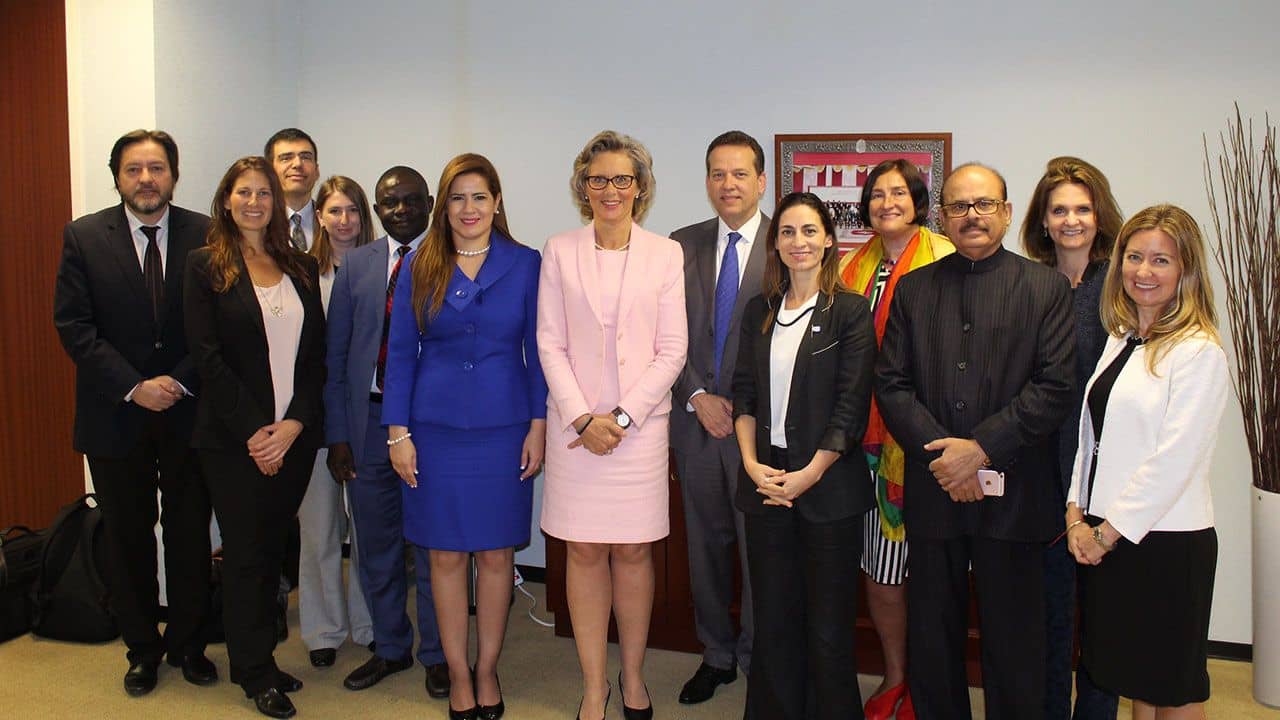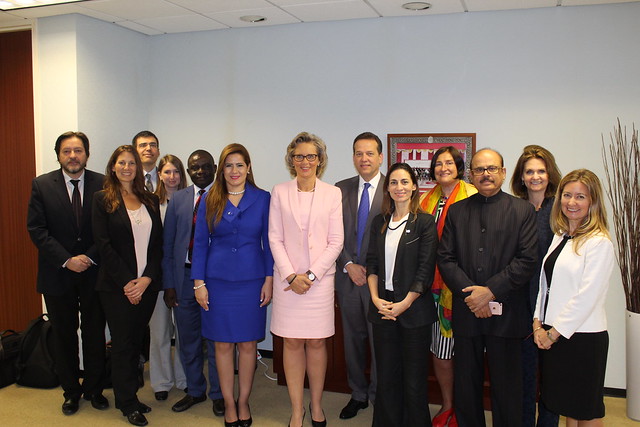
On 8 June 2018, PGA held its first Strategic Roundtable Discussion on Illegal, Unreported and Unregulated Fishing (IUU) and the Cape Town Agreement (CTA), hosted by the Permanent Mission of Malaysia to the UN in partnership with The Pew Charitable Trust.
The meeting provided the opportunity for the PGA Executive Committee Members to contribute input on an effective strategy to fight IUU Fishing and draft a strategic plan for next steps to be taken by PGA. The Strategic Roundtable further benefited from the active participation and presentations from experts in the field from Pew and USAID, who informed participants on the state of IUU fishing and its links to labor exploitation, human trafficking and piracy; and explained the role and importance of the CTA in tackling IUU, including progress made toward its ratification in various countries and regions.
In her welcoming remarks, PGA President, Ms. Margareta Cederfelt, MP (Sweden), highlighted the importance of PGA’s Parliamentary Campaign on Protecting the Oceans and the far-reaching effects of IUU Fishing. To this end, she noted the value of the entry into force of an international binding treaty such as the CTA to give States a powerful tool to ensure accountability and safety for fishing vessels.
Joining via video call, Hon. M. Kulasegaran, MP (Malaysia), Minister of Human Resources and PGA Board Member, expressed his support for the ratification of the CTA, underscoring the need to scrutinize and mobilize on this issue. Hon. Kulasegaran also expressed his appreciation for PGA’s efforts to support Malaysia’s accession to the International Criminal Court, announcing Malaysia’s imminent accession.
Following Hon. Kulasegaran’s remarks, Ms. Julie Janovsky, Acting Director of the Ending Illegal Fishing Project at The Pew Charitable Trust, presented a brief overview of IUU fishing and Pew’s efforts to combat it. Ms. Janovsky informed the participants of IUU Fishing’s global impact, resulting in approximately $23.5 billion in lost revenue from the 26 million tons of fish that are stolen from the oceans. Underscoring the various crimes that are associated with IUU fishing -- including tax crimes, arms and narcotics smuggling, and labor abuses; she illustrated the need for a comprehensive response that engages fisheries, labor, safety sectors, and policies.
In her brief about the CTA, Ms. Courtney Farthing, Senior Associate at The Pew Charitable Trust, explained the link between IUU fishing and unsafe and unacceptable labor conditions for fishing crews in relation to the CTA. She noted that the CTA provides protections for fishers who are often excluded from other maritime conventions; and whose fatalities are 10 times higher than those in the merchant sector. Recognizing the 3 States that have acceded to the CTA in the past 6 months, Ms. Farthing emphasized the importance of continuing the momentum. She proposed that parliamentarians could begin by asking a question of parliament or directly to a decision-maker, or with a debate or early day motion.
Ms. Heidi Schuttenberg, Coastal Resources and Biodiversity Advisor at USAID, further briefed participants on the way IUU fishing leads to fish stock depletions that result in forced labor.
Ms. Schuttenberg identified 3 root causes of the illegal behaviors that stem from IUU fishing: weak rule of law, corruption, and lack of transparency. She also shared a few alarming statistics, noting that 100% of fishers working on boats that tranship crew at sea suffer physical violence. The 3 suggested actions that parliamentarians can take to combat these abuses, as listed: ratify and implement key international treaties, strengthen national legal frameworks and implement measures to protect fishers, strengthen the legal and policy basis for sustainable fisheries management and support for fisheries management authorities.
Discussing the role of parliamentarians in fighting IUU fishing and implementing SDG 14, Ms. Petra Bayr, PGA Treasurer, MP (Austria), underscored the responsibility of lawmakers to implement laws that combat issues harming their constituents. She encouraged parliamentarians to engage in peer-to-peer dialogue by exchanging experience, handbooks, model or draft laws, and other best practices. Ms. Bayr noted that this dialogue is important, even for landlocked States, as all States vote on and contribute to the standard on global issues.
The floor was then opened for an interactive discussion on the topic. Ms. Bayr began the discussion by raising the question of the use of international space programs and satellites to monitor fishing vessels. Ms. Janovsky, in response, indicated that lack of transparency, such as larger vessels that transport fish from smaller fishing boats with abused laborers; makes regulation extremely difficult.
Expressing his support despite a lack of deep sea fishing in the Dominican Republic, the Chair of the PGA International Council, Dip. Victor Orlando Bisonó (Dominican Republic), recognized the importance of addressing this issue to help address the associated human rights violations. Dip. Bisonó proposed the use of seminars and handbooks to facilitate collaboration between States.
Dip. Karina Sosa (El Salvador), also expressed support for the importance of this issue, highlighting the alarming impact on labor and other human rights abuses. She stated the benefit of South America’s collaboration on international conventions, a strategy that could also be helpful on this topic. Dip. Sosa raised the question of sovereignty and how this applies to existing laws of the sea. To this, Ms. Farthing noted deep sea fishing applies outside of a State’s jurisdiction in the ocean, and the responsibility of the vessel falls on the country that licenses the vessel.
Underscoring the importance of addressing human rights and environmental abuses on this issue, Dip. Tucapel Jimenez (Chile), expressed support for the current opportune time for action. Dr. Suzi Barbosa, MP (Guinea-Bissau) also expressed support, recognizing the benefit to women, as women are highly involved in the fishing industry.
PGA Secretary-General, Dr. David Donat Cattin, remarked on the accessibility of materials available to policymakers to address this issue. PGA, he noted, is hoping to expand our work on this topic; thereby making materials more accessible to policymakers, and facilitating the sharing of information and best practices between States.
In her closing remarks, Ms. Cederfelt underscored PGA’s dedication to making a difference in this area, the need for international law, and the importance of collaboration. There is no border in the high seas, she noted. As she closed the meeting, Ms. Cederfelt thanked all participants, particularly Pew for its funding and partnership in addressing the issue of IUU Fishing.
For any questions on the work of the PGA protection of the oceanss and Implementation of SDG 14, please contact the PGA Consultant on the Oceans Campaign, Ms. Saarah Monawvil at .




